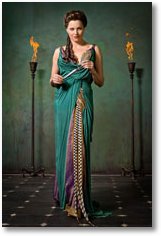 "It's wonderful what fear can do to the human spirit."
"It's wonderful what fear can do to the human spirit."
Given the headline of this article, there's a 50 percent chance that you would assume that the above quote is from "Spartacus," Starz's gladiator drama that's well known for its regular displays of violence.
But the quote comes from Mrs. Patmore, the cook on "Downton Abbey," who makes that observation in an upcoming Season 2 episode of the tony PBS period piece.
And I'm betting you can believe that statement came from a character on the PBS show, because both of these dramas, despite their surface differences, cover very similar terrain.
Both "Downton Abbey" and "Spartacus" are obsessed with power. Who has it? Who wants it? Why do people wield it the way they do? What do people will do to obtain it? And what do people have to sacrifice in order to break free of the rigid rules that hold them in place? Fear and power go hand in hand, which is something the long-suffering Daisy, Mrs. Patmore's sole minion, knows well.
"Downton" and "Spartacus" may be set a couple thousand years apart, but both shows depict constant struggles for control and strenuous attempts to enforce laws and longstanding customs. Whether the characters are wearing loincloths or corsets, the paths they travel aren't all that dissimilar: Most people in "Downton" and "Spartacus" want to escape their situations, or change them in some fundamental way, but they usually have to give up a lot to alter their circumstances just a little.
I'm a fan of both shows because they explore these ideas about power and autonomy via a roster of compelling characters, all of whom are forced to interact in close quarters. In both "Downton's" and "Spartacus'" respective hothouse environments, characters in very different classes are constantly negotiating what kinds of intimacy and intimidation are allowed and what kinds aren't. Sure, "Spartacus" may be the less polite drama, but it's no less moving once you get invested in its characters' quests for love, safety and a few scraps of emotional fulfillment.
Still don't believe the shows have a lot in common? Seriously, they do:
They both value language and boast their own distinctive syntaxes. The Dowager Countess' elegantly vicious put-downs are every bit as memorable as the Shakespeare-meets-the-street rhythms of "Spartacus."
They're both period pieces that don't feel musty or completely removed from modern life. We may not live in manor houses or ancient villas, but we can relate to the characters' desires to better themselves and control their own fates.
They both boast memorably complex characters who can surprise you with their deviousness or their unexpected altruism. Sure, a few of the characters on both shows are one-dimensional, but both shows also have such large ensembles that it's not hard to find protagonists to care about.
They both embrace the soapier aspects of their stories (Love! Betrayal! Unexpected deaths! Illicit sexytimes!). Neither is re-inventing the wheel when it comes to their genres (i.e., period drama and gladiator epic), but at their best, they are excellent examples of their genres and expertly dispense cliffhangers, declarations of love, confrontations and sly humor.
They're both strongly serialized, and in that regard, I'd say "Spartacus" is the more finely crafted affair. "Downton," which I remain addicted to despite some its Season 2 wobbles, looks classier, but this season, as I said in my review, it lurches from story to story somewhat ungracefully. "Spartacus," on the other hand, is one of the most meticulously constructed shows I've ever seen. Really.
I could go on comparing the two shows despite their wildly different reputations. "Downton Abbey," after all, is the darling of the "We Love Quality TV" brigade and airs on PBS. It's so proper that it practically serves you crumpets through your TV screen (and if it did, I wouldn't object).

